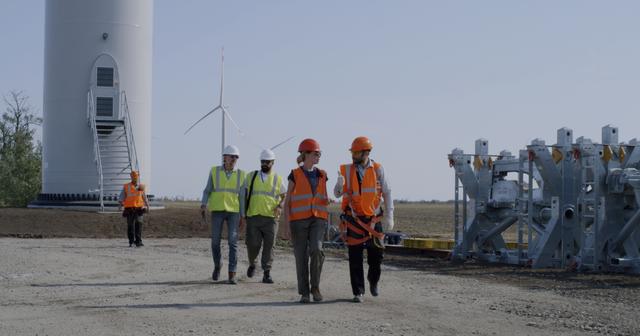Yorkshire workers share views on green transition
Tue, 02/01/2022 - 10:39

Workers from across Yorkshire and Humber feel outraged about the climate crisis, but some remain optimistic that new green jobs will arrive in their local communities, according to new research.
Dr Jo Cutter and Professor Vera Trappmann from Leeds University Business School led the project on worker perceptions of climate change and the green transition, working closely with researchers from the Place-based Climate Action Network (PCAN).
Their new report was prepared to inform policymaking for building a regional ‘just transition’ and to feed into the work of the Yorkshire and Humber Climate Commission.
Dr Cutter, a Lecturer in Work and Employment Relations, said: “The idea of a ‘just transition’ focuses on the interventions needed to ensure that, as the economy shifts towards more sustainable production and combatting climate change, support is in place for the workers and communities affected.
She added: “It has been great to build the collaboration between the Business School and PCAN researchers to explore this issue in more detail in Yorkshire and the Humber.”
Co-author Dr Andrew Sudmant, a PCAN Associate based at the University of Leeds, said: “The transition to a net-zero economy isn’t achievable if we aren’t prioritising the rights and livelihoods of workers.
“In Yorkshire and the Humber there is not only a large concentration of workers today who are employed in high carbon industries, but there is a large and growing workforce employed in industries that will be at the forefront of the green economy: zero carbon energy, high efficiency homes, electric cars, green chemicals and pharmaceuticals, and new materials.
“Yorkshire and the Humber is also an important place for researchers and policymakers to focus as it experienced a recent economic transition with the closing of coal mines that left a mark on both the economy and society.
“Results from this project emphasise that investment in workers, in addition to the physical infrastructure of the green economy, is critical for ensuring a rapid transition, but also for ensuring that the transition is sustainable for communities.”
Working closely with the Yorkshire and Humber TUC Low-Carbon Taskforce, which includes unions and business leaders from regional carbon-intensive sectors, the research gathered data on the skills, employment and redeployment needs facing workplaces implementing low-carbon transition plans.
Mixed emotions
The findings were drawn from a nationally representative survey of 2000 UK workers and showed that the investment in skills and involvement of workers in decarbononisation programmes early on is a key recipe for success. These insights have particular relevance to policymakers, businesses and trade unions.
It was noted that workers have a mix of emotions about the climate crisis, ranging from hope, to fear, anger and outrage. The sense of outrage was found to be the most strongly felt emotion across the UK sample and significantly more Yorkshire and Humber workers reported this than the national average.
Workers in Yorkshire and Humber also felt quite optimistic about community level impacts of the green transition, with nearly half expecting new green jobs to arrive in their local communities. While a significant minority expected disruption (losing jobs, having to move) almost three quarters were interested in a ‘green job’.
The key takeaways for policymakers, business and trade unions are:
- Investing in skills is important now and workers are ready to undertake training and development to prepare for green transitions.
- In addition to occupational training and workplace learning, general carbon literacy training for all workers is also needed to improve the knowledge base around climate change and green transition.
- Involving workers in decarbonisation programmes early on is a key recipe for success. This requires more complex and sustained forms of dialogue between employers, workers, local authorities and training providers to engage workers directly on the employment effects of climate policy and to better understand how job change, upskilling or re- skilling and the transition to new roles can best be supported.
- Tackling climate change is seen as a key responsibility of governments, failing to address this now can potentially lead to further political disengagement.
Dr Cutter and Professor Trappmann are from the Leeds University Business School’s Centre for Employment Relations, Innovation and Change (CERIC), and the project was supported with funding from UKRI Research England.
Download the full report from the Leeds University Business School - Worker perceptions of climate change and the green transition in Yorkshire and the Humber: Building the evidence base for the just transition in the region
Find out more about the research project.





